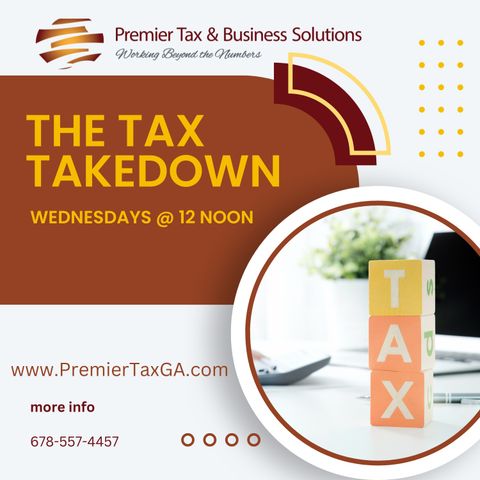www.PremierTaxGA.com Hello, everyone, and welcome back to another insightful episode of The Tax Takedown, brought to you by Premier Tax & Business Solutions. I'm your host, Carla Nash, and today we're going to tackle a topic that's often a source of anxiety for business owners - Managing Business Loans and Debt. Debt, it's a word that can send shivers down the spines of many entrepreneurs, but the truth is, it's often a necessary tool for growth. Whether you're just starting your business or looking to expand, managing loans and debt effectively can make all the difference. Let's start with the basics. Why might a business need a loan or incur debt? Well, it could be for a variety of reasons: to fund startup costs, purchase equipment, expand operations, or simply cover cash flow gaps during slow periods. The first step in managing business loans and debt is understanding your financial needs. Before you even think about taking on debt, create a detailed budget and forecast to determine how much you require and what you can realistically afford to repay. When it comes to choosing the right type of financing, it's essential to explore your options. You can consider traditional bank loans, SBA loans, lines of credit, or even alternative sources like crowdfunding or angel investors. Each option comes with its own terms, interest rates, and eligibility criteria. Once you've secured a loan, it's crucial to manage it wisely. First and foremost, make timely payments. Late payments can damage your credit and lead to additional fees. So, set reminders, automate payments if possible, and never let due dates slip by. Another critical aspect of managing debt is understanding the terms of your loans. Know the interest rates, repayment schedules, and any covenants or conditions that come with the loan. Being aware of these details will help you plan and avoid any surprises. Now, let's talk about debt consolidation. If your business has multiple loans with varying terms and rates, consider consolidating them into a single loan with more favorable terms. This can simplify your financial management and potentially reduce your overall interest costs. Additionally, it's essential to have a contingency plan in case your business faces unexpected challenges. A well-thought-out strategy for handling financial setbacks can make the difference between bouncing back and closing up shop. And finally, remember that not all debt is created equal. Some debt may be tax-deductible, while others are not. Understanding the tax implications of your loans can help you make informed decisions and potentially save money come tax time. In conclusion, managing business loans and debt is a critical skill for every entrepreneur. It can be a powerful tool for growth when used wisely, but it can also become a burden if not managed properly. So, take the time to assess your financial needs, explore your options, and create a solid plan for managing your debt. Thank you for joining me today on The Tax Takedown, brought to you by Premier Tax & Business Solutions. If you have any questions or need assistance with managing your business loans and debt, don't hesitate to reach out to our team. Until next time, stay financially savvy and keep building the business of your dreams.
show less


Comments